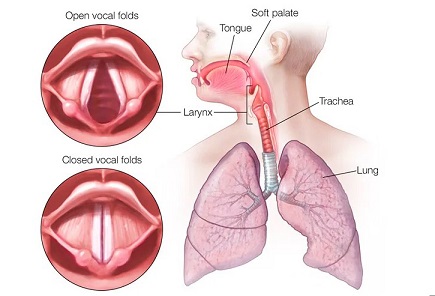BREAKING COVID-19 News! Boston Doctors Warn That SARS-CoV-2 Can Actually Make You Dumb! Bilateral Vocal Cord Paralysis Reported In Infected Teen!
Nikhil Prasad Fact checked by:Thailand Medical News Team Dec 20, 2023 2 years, 2 months, 1 week, 5 days, 12 hours, 43 minutes ago
COVID-19 News: In a medical landscape dominated by the respiratory implications of COVID-19, a remarkable case has emerged, shedding light on the virus's less-explored neurological consequences. The intricate tale involves a 15-year-old girl who, after contracting SARS-CoV-2, experienced bilateral vocal cord paralysis and lost her ability to speak, presenting an unparalleled challenge for physicians and researchers alike. This
COVID-19 News report delves into the details of this extraordinary case, providing a comprehensive examination of the neurological impact of COVID-19 on teenagers, exploring diagnostic challenges, treatment modalities, long-term effects, and implications for future considerations.
 Bilateral Vocal Cord Paralysis
The Puzzling Presentation
Bilateral Vocal Cord Paralysis
The Puzzling Presentation
The teenage patient, previously a picture of health, found herself at Massachusetts General Hospital's emergency department, grappling with respiratory distress merely nine days post-COVID-19 diagnosis. What transpired during the subsequent examination with an endoscope was unprecedented - an observation of bilateral vocal cord paralysis, a condition typically unheard of in the aftermath of a viral infection. Physician-researchers at Mass Eye and Ear, a member of Mass General Brigham, reported in the case report that this marked the first pediatric case of such paralysis following COVID-19, suggesting a neuropathic complication linked to the virus.
Diagnostic Challenges: Unraveling the Mystery
In an attempt to comprehend the complexity of this rare complication, the medical team embarked on a meticulous diagnostic journey. The patient underwent a battery of tests, including blood work, imaging studies, cerebrospinal fluid analysis, and consultations with otolaryngology, neurology, psychiatry, speech language pathology, and neurosurgery. The extensive workup, aimed at ruling out alternative causes, failed to identify any other etiology for the bilateral vocal cord paralysis, pointing towards a potential nervous system-related sequelae of the SARS-CoV-2 virus.
Treatment Modalities: From Speech Therapy to Tracheostomy
Given the severity of the respiratory distress, initial efforts focused on speech therapy to alleviate the patient's symptoms. However, when conventional treatments proved ineffective, the medical team opted for a tracheostomy - a surgical procedure involving the creation of an opening in the windpipe. This intervention became crucial for maintaining the patient's breathing, emphasizing the gravity of the neurological impact of COVID-19 in this particular case. Notably, the tracheostomy dependency persisted for an unexpected duration—more than 13 months post-initial treatment, challenging assumptions about the transient nature of nerve complications associated with the virus.
Long-term Effects and Gradual Recovery
The
enduring tracheostomy dependence raised questions about the lasting effects of COVID-19 on the nervous system. Surprisingly, the removal of the tracheostomy, a significant milestone, occurred 15 months after its insertion. This coincided with the patient's high school graduation and prom, portraying a positive trajectory in her recovery. The case emphasizes that while nerve complications from COVID-19 may not always be temporary, sustained medical attention and intervention can lead to positive outcomes, even in severe and unique cases.
Understanding COVID-19 Neurological Complications
Beyond its well-established respiratory manifestations, COVID-19 has increasingly manifested in various neurological complications. These include headaches, dizziness, brain fog, altered taste, and smell, affecting both adults and children. The case of bilateral vocal cord paralysis in the teenage patient adds a new layer to this understanding, underscoring the importance of recognizing neuropathic effects in children presenting with post-COVID respiratory, talking, or swallowing complaints.
Pediatric Neurological Complications: A Growing Concern
With over 15 million reported cases of pediatric SARS-CoV-2 infection by February 2023, concerns regarding potential neurological complications in children become paramount. The rarity of cases like bilateral vocal cord paralysis in a young, previously healthy individual prompts a reevaluation of assumptions about the virus's impact on diverse bodily systems. The medical community must acknowledge and address these complications, especially as they deviate from conventional expectations.
Insights from Medical Professionals: A Call for Vigilance
The physician-researchers involved in this unprecedented case underscore the importance of vigilance in identifying and treating neurological complications in children post-COVID. Dr. Danielle Reny Larrow, the first author of the report, emphasizes the need to consider potential complications like vocal cord paralysis in children with breathing or swallowing issues after a recent COVID-19 diagnosis. Dr Christopher Hartnick, the senior author, stresses the broader pediatric community's awareness of the possibility of long-term neurotrophic effects from COVID-19.
Implications for Future Considerations: A Plea for Awareness
As of February 2023, the reported cases of pediatric SARS-CoV-2 infection have exceeded 15 million, signifying the widespread prevalence of the virus among children. The neurological impact, including vocal cord paralysis, must be integrated into the differential diagnosis for children exhibiting voice, swallowing, or breathing issues post-COVID. This is crucial in preventing misdiagnoses, such as attributing symptoms to more common conditions like asthma, especially when patients do not respond to treatment as expected.
Conclusion
The case of bilateral vocal cord paralysis in a teenager, triggered by SARS-CoV-2 infection, unravels a complex facet of COVID-19's impact on the nervous system. With an increasing number of pediatric COVID-19 cases, the medical community must remain vigilant and consider neurological complications in their diagnostic approach. This unique case calls for continued research, awareness, and adaptability in medical practices, ensuring that children experiencing post-COVID respiratory or neurological symptoms receive prompt and accurate medical attention. As the world grapples with the ongoing pandemic, understanding and addressing the full spectrum of COVID-19's effects on health remain critical for effective patient care and public health management.
Th study findings were published in the peer reviewed journal: Pediatrics.
https://publications.aap.org/pediatrics/article/doi/10.1542/peds.2023-061897/196221/Bilateral-Vocal-Cord-Paralysis-Requiring-Long-term
For the latest
COVID-19 News, keep on logging to Thailand Medical News.
